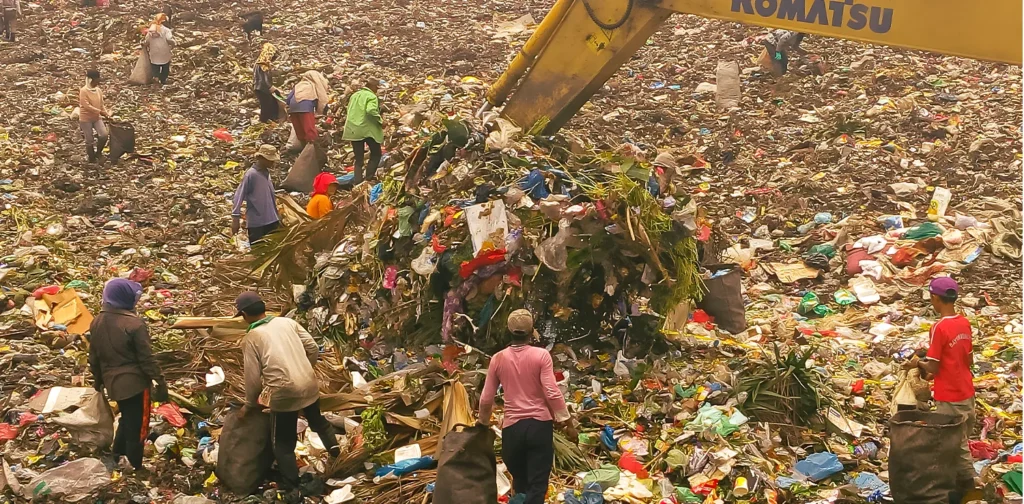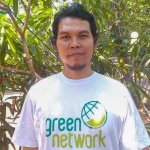Looking into the End to the Open Dumping in Indonesia

Informal waste workers at the open dumping final processing site in Medan, Indonesia. | Photo by Abul Muamar.
Every day, millions of people produce various types of waste, from food to plastic packaging. In many developing countries, including Indonesia, people would put their household trash in big bags and have them carried away by garbage collectors. The trash would then end up dumped at the final waste processing sites, turning into ever-growing mountains of solid waste. In an effort to curb this, the Ministry of Environment plans to end open dumping in Indonesia.
Open Dumping in Indonesia
Open dumping refers to the municipal solid waste (MSW) management practice where MSW is simply dumped at some open land without any covering, safety measure, or treatment. Contrary to its prevalence in Indonesia, open dumping is not a recommended practice due to the harm it brings to the environment and public health.
This method causes significant soil, water, and air pollution, primarily from the leachate and the smell of rotting waste. Untreated mounting solid waste also releases high quantities of methane, a gas that contributes to global warming and climate change. Moreover, open dumping sites also become breeding grounds for disease vectors like flies, rats, mosquitoes, and others.
In 2008, the Indonesian government enacted a law that mandated local governments to close open dumping final processing sites, with a five-year grace period. However, hundreds of open dumping sites are still operating across the country in 2025.
Back and Forth
In November 2024, the Indonesian Ministry of Environment announced the plan to close 306 of 550 open dumping sites by the end of 2025. The plan is accompanied by a letter of mandate addressed to 343 local governments to close their open dumping sites and sanction those who disobey. Besides that, the Ministry of Environment also sent letters to 613 major goods producers to accelerate the completion of the waste reduction roadmap per Ministerial Regulation No. 75 Year 2019.
“We are currently constructing the steps for a curative treatment for all waste in Indonesia. It may be bitter, but that’s what we have to do,” said Minister of Environment Hanif Faisol Nurofiq.
The instruction to end open dumping in Indonesia actually first came out in 2009. However, the plan keeps going back and forth due to several factors. One primary reason is the lack of readiness and an alternative waste management system that is more effective, environmentally friendly, and has positive impacts on the economy of local communities.
Toward Sustainable Waste Management
The nation-wide closing of open dumping sites is good news, especially viewed from the environmental aspect that supports public health. However, the government must be ready with new, more effective and sustainable waste management practices to replace open dumping in Indonesia.
Among the options is the waste-to-energy system that turns municipal solid waste into electricity. A more transformative solution is by changing the approach to waste entirely with circular economy principles. Businesses can significantly reduce waste generation with the Extended Producer Responsibility approach. At the household and individual level, proper waste sorting and recycling can go a long way.
As open dumping in Indonesia comes to an end, it is important to remember that final processing sites are a source of income for thousands of scavengers and other informal waste workers. Closing them just like that means eliminating their livelihood. Therefore, all impacts of this step must be comprehensively anticipated from the beginning.
Besides the environmental aspect, the socio-economic aspect is also vital as to not leave anyone behind. On the contrary, integrating informal waste workers into the system can be a meaningful step in the efforts toward creating a sustainable waste management system.
Translator & Editor: Nazalea Kusuma
The original version of this article is published in Indonesian at Green Network Asia – Indonesia.

Co-create positive impact for people and the planet.
Amidst today’s increasingly complex global challenges, equipping yourself, team, and communities with interdisciplinary and cross-sectoral insights on sustainability-related issues and sustainable development is no longer optional — it is a strategic necessity to stay ahead and stay relevant.

Abul Muamar
Amar is the Manager of Indonesian Digital Publications at Green Network Asia. He holds a Master’s degree in Philosophy from Universitas Gadjah Mada and a Bachelor’s degree in Communication Studies from Universitas Sumatera Utara. He has over ten years of professional experience in journalism as a reporter and editor for several national-level media companies in Indonesia. He is also a writer, editor, and translator with a particular interest in socio-economic and environmental issues.


 Indian Gig Workers Push Back Against 10-Minute Delivery Service Strain
Indian Gig Workers Push Back Against 10-Minute Delivery Service Strain  Call for Governance: Grassroots Initiatives Look to Scale Efforts to Conserve Depleting Groundwater
Call for Governance: Grassroots Initiatives Look to Scale Efforts to Conserve Depleting Groundwater  Integrating Environment, Climate Change, and Sustainability Issues into Education Systems
Integrating Environment, Climate Change, and Sustainability Issues into Education Systems  Finally Enforced: Understanding the UN High Seas Treaty
Finally Enforced: Understanding the UN High Seas Treaty  Risks and Opportunities of Submarine Communication Cables for Sustainable Development
Risks and Opportunities of Submarine Communication Cables for Sustainable Development  Rising Attacks and Violence Against Land and Environmental Defenders
Rising Attacks and Violence Against Land and Environmental Defenders